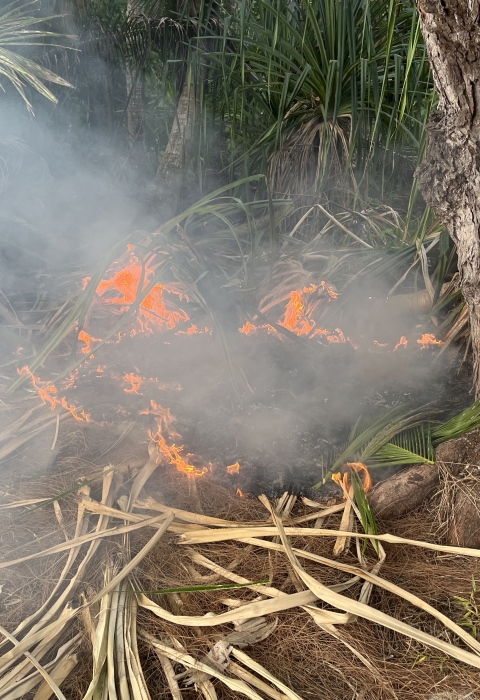On Guam, a typical Sunday is a time when families get together and barbeque at the beach. In fact, the smell of barbeque at the beach is nostalgic for many residents. The Guam National Wildlife Refuge at Ritidian, or commonly known as Ritidian, is one of those special places for the island community to enjoy their weekends with family, friends, and good barbeque. However, there's another aspect to barbeque culture that we must acknowledge. Unfortunately, some visitors dump their charcoal on the ground before they leave the Guam National Wildlife Refuge - making it a visitor safety risk and danger to wildlife habitat.
Last month at closing time, our staff smelled smoke and noticed burning at the base of the extremely flammable ironwood tree, or trongkon gågu in the CHamoru language. Finding the source, they discovered a fire had ignited from freshly dumped charcoal. Can you imagine if nobody noticed that fire? The refuge could have lost large areas of vegetation and habitat for wildlife. Luckily, our dedicated Sunday staff put out the fire before it grew any larger!
It wasn't an easy management decision to make, but US Fish & Wildlife implemented a new regulation to ban the use of charcoal and/or plant-based materials at the Guam National Wildlife Refuge. This became necessary as charcoal dumping in prime sea turtle nesting areas became more common.
It's just not worth the risk. As one of the few undeveloped and publicly accessible areas in northern Guam, the Guam National Wildlife Refuge at Ritidian is one of the few places people can visit and experience limestone forest areas and see ancient indigenous CHamoru sites. Ritidian is a place where families share stories of Guam's rich heritage and history - a place where we can work together to bring back our endangered species, such as the Ko'ko' (Guam Rail) or Sihek (Guam kingfisher).
On your next visit, you'll notice these new barbeque regulation signs. Barbecue culture and picnicking at the beach can still be part of spending a day at Ritidian. Visitors may still bring your butane burner or gas grill for hot meals with family and friends. Let’s all work together to protect Litekyan, which is Ritidian’s indigenous CHamoru name, from fire risk. No charcoal dumped at the beach means we are all protecting sea turtle nesting habitat. So next time you see the sea turtle nesting areas this summer, think of yourself as an ambassador protecting new generations of our beloved haggan, or Green sea turtles in the indigenous CHamoru language.







